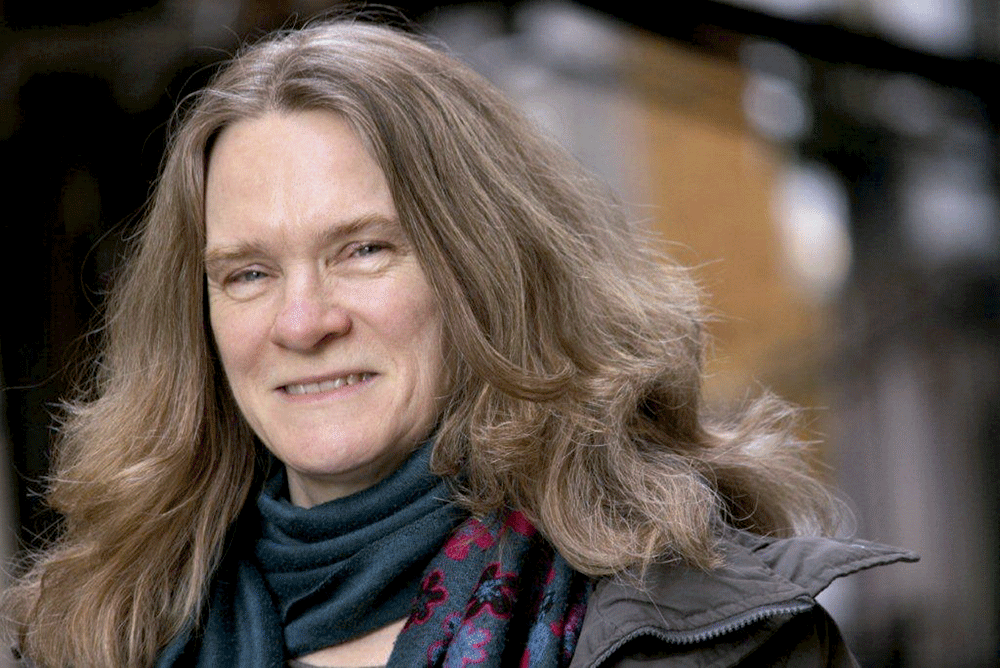"We're not just a part of England, totally English."
- To your “It’s cold!”, replies Julia Sallabank (Amersham, England, 1960), professor at SOAS University in London. Last January Oihaneder was in the cold of Gasteiz, in the Hitz Adina Mintzo course, in the Basque House. He spoke about the language of the island of Guernsey, on the English Channel, the guernsey.

You were about to start your speech when you asked your auditorium if anyone knew anything about Guernsey, if someone knew your name. But nobody knew anything.
It's curious that he doesn't know anything, because Guernsey is a small place. Guernsey is known in the United Kingdom for being a tourist site and for the history of World War II. For the rest, what people know about our island is insignificant… Guernsey is a sign of place in the history of the United Kingdom, as the Channel Islands were the only territory of the kingdom occupied by the Germans. They have also made several films on this subject, under the name of Guernsey, which has also contributed to people getting to know the island.
I have read a story of the children of the island of Guernsey, related to the Second World War.
Yes, yes. I was told by a woman I met a long time ago. The woman, who is now 90, remembers, when she was still a little girl, that she was on the beach and people had come, screaming and screaming: “Come Germans, come Germans! If you want to leave here, you have to do it right now, quickly. Several boats are now heading for England! You don’t know if there will be another chance later!” It is clear that half of the population left, including several children. In many cases, these children did not have contact with their parents in five years, nor communication with their families. They separated the children into several families, with their brothers often separated, and since then they had no opportunity to speak in guernsey.
So they spoke to the Guernsey.
Many of them, yes. They were field! In England, during that time of war, no one relied on the one who spoke in any language other than English, no one’s spies and the other’s licensors, no one trusted anybody and, as a result, those children did not speak in guernsey.
We had no news of the Channel Islands, although we didn't know they were in Guernsey. What is your situation?
The habitability of a language is well known and, as far as that is concerned, there is a risk that it will disappear in Guernsey. There are no Guernsey speakers under the age of 45. At best, you'll have a kid who knows Guernsey, but doesn't have to talk to. The only weird speakers who speak loudly about the Guernsey are those over 70 years old. There are a lot of people, between the ages of 50 and 70, who are in the guernsey brain, that is, when I was young, but they didn't really talk in guernsey. You get it. Among them is a group that wants to revive the guernsey, reactivate the language and is working on it. It seems to me that these are the greatest hopes for the future of language, because it was once heard in guernsey, and now they have it in the brain, they have no choice but to take it to the surface. On the other hand, they want to use language between friends and friends. It's not just about fun.

Do guernsey and guernsey speakers have any kind of legal protection, language policy?
Hardly. A language policy, whatever the language, means money and recognition, and as far as that is concerned, we have nothing in Guernsey. Moreover, many think that French is their official language, because until the beginning of the twentieth century the language of instruction was French, “language of civilization”, and along with it, the local languages were synonymous with the “poor French”, that is, they believed that no one other than the peasants who worked in the fields of cultivation was used by the guernsey.
The prestige is not guernsey…
None of that! However, centuries ago it was the language of William the Conqueror. The language of the Normans, therefore, was something we were proud of. Now, exactly the other way around, in Guernsey himself. In the 19th century, several people headed from Britain to the Channel Islands, where life became warmer and cheaper. After the Napoleon wars, the pensioner soldiers did not have enough money to live in England, but they could live very well in the Channel Islands. A middle class was formed and then a higher class looking at the islanders from the top down. From there it is hardly possible to emerge a boom in the language of these “downstairs”. No prestige.
The speaker still has guernsey, as you said.
I do not think it is too late. On the island of Man, for example, something terrible has happened: In 1974, the last great speaker was lost there, and today there will be 200 or 300 skilled speakers, and maybe about 700 who know some brushes. I believe that we too are along the same lines. You have to keep it before it gets lost forever, you have to activate people before it's too late.
Does Guerneseyera have any entrance to schools?
It doesn't have legal recognition, it doesn't have a presence in school, people don't consider it a language of their own. It only has an annex, “scarce dialect”, local language… It is an unofficial subject in some places, outside school hours, half an hour a week, for example. They call good speakers to go to school, but they're not really good speakers, because there's no good speaker if you don't speak the language. You have elders, they rarely meet each other, and one of them dies, the living has no one to talk to in guernsey.
So, the death of good speakers is accompanied by the death of language.
He's going to lose and lose the language. However, those people who go to school, that good speaker, are usually retired workers. Once a week she goes to school, for half an hour… she doesn’t know how to teach it. These speakers were children during World War II, they couldn't get into school, but they also had to learn German. I remember one woman said to me: “When I was young I wanted to be a teacher, but I didn’t have enough class. Now I can teach guernsey, and that makes me proud, I'm happy." But that's not a real teaching system.
“There is no Guernsey speaker under 45 years old. At best, you’ll have a kid who knows Guernsey, but doesn’t have to talk to.”
Isn't it?
It is not an effective teaching. I mean, it's important that the speaker is proud, but that's not teaching: neither materials, nor goals, nor pathways... Sometimes, it's nothing more than out-of-school activity -- parents want children always busy -- sometimes those parents have a real interest in language, but they don't want to learn, or they think as much as possible: “Adults cannot learn, but children will learn for us, it will serve them in the future.” But kids don't care if language is going to serve them in the future, if you have fun, they'll learn, and if not, little attention to language.
What are the guernsey's priorities today?
In the case of such a language – with a small number of speakers – my priority is to create a multitude of intensive speakers among adults, because today we do not have it. We have older speakers, seniors and some kids, but we don't have serious intern speakers, and without them you can't form a community of speakers. That's what I'm on, and that's what I'm working on.
Why should we study the Guernsey?
I have heard that said many times. The Guernsey is not a great language, it is not French, English, or Chinese… Some say that: “It’s more important to learn a great language, it’s more useful!” The same word always: “useful”. Look, in Guernsey, we've had a survey about the interest in learning the language. I've just arrived about 30-40, who are studying in Guernsey, and I've talked to them one by one. You said: “It’s my language, I can say something in guernsey to my clients, I have an emotion language...” Many tourists live on the island and, along with them, there are residents of the United Kingdom who are married to those of Guernsey himself. Some of them want to know more about the local culture, to strengthen ties with the community. They barely use the word “useful.”
What is the relationship between guernsey and identity? We have one of the issues that you have looked at.
There are people who think that language is an important part of identity, but the person who has the represented language will tell you that to own that identity you don't have to know that language, that there's another path to owning an identity. Some will insist on customs, others on local food, others on beaches, others on nature… We mean that people build their identity in many ways, but on the island of Guernsey it is nowhere else, it is a rare thing, and that is what we are trying to underline. We are not, quite simply, a part of England, totally English – this is the case with other islands – in Guernsey we have a different language, we have something worth promoting.










